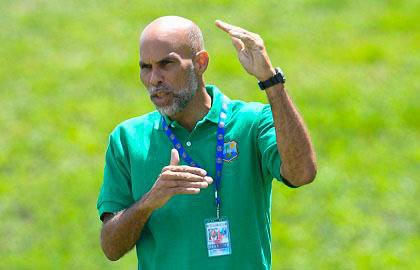Cricket West Indies’ Director of Cricket, Jimmy Adams has revealed that the body is closely watching the developments of the Omicron variant of COVID-19.
Adams made this disclosure during a press conference on Saturday where he said it was top priority for West Indies to have its regional first-class tournament back onto the field.
“This new variant something we are watching very closely, 100 percent, he said.
“To go into specifics on what we are looking for is very difficult because we don’t have all the information on it in terms of how well those players that are vaccinated or anybody that is vaccinated will cope against it there are still a lot of information that we don’t have,” he added.
The Director of Cricket said rolling out the first class competition was still high on the agenda.
“However, not having First Class cricket in too long, we now have on paper to roll out first-class cricket in February early next year and, from a regional point of view, that is a priority, that is at the top of our wish list, we need to get playing our regional players playing red ball cricket so we will be watching closely what is happening.”
He promised that everything will be done to protect the first-class fixtures.
The International Cricket Council was forced to call off the Women’s World Cup Qualifiers Saturday as a result of a positive COVID-19 test and the Omicron development.
West Indies Women are currently in Zimbabwe and with the cancellation of that tournament, CWI is turning its attention to getting them safely home.
Adams said they were “definitely safe” but expressed that there are concerns.
He said, “without a doubt there are concerns but we are doing the best that we can to ensure that all information that we have we are sharing and all the plans that we can make we are sharing with them so we are getting information from them and to them as quickly as possible and as soon as we can get them out of Zimbabwe we will do that… In terms of the routing home, that is still to be decided and we are doing everything we can. The key is communication.”
Omicron was first reported to the World Health Organization (WHO) by South Africa on Wednesday, and early evidence suggests it has a higher re-infection risk. It has been categorised by the WHO as a “variant of concern”.
Cases of the heavily mutated variant have now been reported in a number of countries around the world, including several in Europe, such as the UK, Germany and Italy.
Some 61 persons recently tested positive for the new variant between South Africa and Netherlands flights.
The European Union is restricting travel to and from seven countries in southern Africa including Botswana, Eswatini, Lesotho, Mozambique, Namibia, South Africa and Zimbabwe while the United States and South Korea have targeted those countries and Malawi. Britain has restricted travel with those eight nations and Angola, Mozambique and Zambia.
Canada, Australia, Russia, Thailand, Sri Lanka, Singapore, Saudi Arabia, Oman and Morocco have all announced similar restrictions.
Israel announced the most restrictive ban Saturday, saying it would close its borders to foreign nationals for two weeks.

